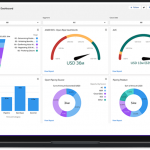The care industry plays a crucial role in supporting some of the most vulnerable individuals in society, from elderly people to those with disabilities and long-term health conditions. As the demand for skilled and compassionate care workers continues to grow, so does the need for accessible, high-quality training. However, traditional classroom-based training can be challenging for care workers, who often have demanding schedules and little time to spare.
This is where eLearning has emerged as a game-changer, empowering care workers with flexible, effective, and engaging opportunities for professional development. With interactive courses, online modules, and real-world scenario training, eLearning offers an efficient way for care workers to enhance their skills, meet industry standards, and achieve personal growth within the sector. In this blog, we explore how eLearning is transforming professional development in the care industry and supporting a highly competent and confident workforce.
- 1. Providing Accessible and Flexible Learning
- 2. Covering Essential Skills and Core Competencies
- 3. Enhancing Engagement and Knowledge Retention
- 4. Supporting Continuous Professional Development
- 5. Streamlining Compliance and Certification
- 6. Building Confidence and Reducing On-the-Job Stress
- 7. Improving Quality of Care and Enhancing Reputation
- Conclusion
1. Providing Accessible and Flexible Learning
The care industry is unique in its need for a flexible workforce. Care workers often have varied and sometimes unpredictable schedules, making it challenging to find time for traditional, in-person training sessions. eLearning offers a flexible solution, allowing care workers to access training modules whenever it suits them, from anywhere with an internet connection.
With eLearning, care professionals can learn at their own pace, pausing and resuming training as needed. This approach reduces the pressure to complete training within a set timeframe, making it ideal for care workers balancing demanding shifts or personal commitments. Importantly, it ensures that training does not disrupt the continuity of care, allowing workers to upskill without interrupting their work.
2. Covering Essential Skills and Core Competencies
Care workers require a wide range of skills and knowledge to provide high-quality support. eLearning programmes cover essential areas, equipping care professionals with the competencies needed to deliver safe, compassionate, and effective care. Care certificate training, for instance, provides foundational knowledge in areas such as safeguarding, infection control, and health and safety, all of which are critical for meeting industry standards.
By covering core competencies in a structured, accessible format, eLearning helps care workers build a strong foundation for their roles. This not only benefits the individuals they care for but also instils confidence in the workers themselves, knowing they have received thorough, high-quality training.
Key areas covered by eLearning include:
- Safeguarding and protection: Training on recognising and responding to signs of abuse, which is essential for protecting vulnerable individuals.
- Infection control: Essential for preventing the spread of illness, particularly important in residential and home care settings.
- Dignity and respect: Equipping care workers with the skills to deliver person-centred care that honours the dignity and autonomy of each individual.
- Health and safety: Covering everything from manual handling to emergency procedures, ensuring care workers can perform their duties safely.
3. Enhancing Engagement and Knowledge Retention
One of the biggest challenges with traditional training is keeping learners engaged. eLearning addresses this by incorporating multimedia elements, such as videos, quizzes, and interactive scenarios that make learning more engaging and enjoyable. These tools not only keep care workers interested but also improve knowledge retention, helping them apply what they’ve learned in real-world settings.
Interactive elements can include:
- Video demonstrations: For tasks like manual handling, video demonstrations are an effective way to visually communicate techniques that workers can follow step-by-step.
- Scenario-based learning: Realistic scenarios give care workers the opportunity to work through complex situations in a virtual environment, helping them develop critical thinking and problem-solving skills.
- Quizzes and assessments: Regular assessments help reinforce important concepts and allow care workers to measure their understanding, reinforcing key information as they progress.
This level of engagement is particularly valuable in the care industry, where workers need to retain and apply knowledge in often high-pressure situations.
4. Supporting Continuous Professional Development
Continuous professional development is essential for care workers, as it ensures they remain up-to-date with the latest industry standards and best practices. eLearning platforms offer a convenient way for care workers to pursue ongoing education, taking courses on topics that may not have been covered in their initial training or that reflect emerging industry trends.
For example, eLearning platforms can offer modules in dementia care, mental health awareness, or end-of-life care, providing care workers with the opportunity to develop specialised skills that improve the quality of care they deliver. By offering courses that go beyond the basics, eLearning supports professional growth and opens doors for career progression, helping care workers expand their expertise and stay engaged in their roles.
Additionally, eLearning’s modular format allows care providers to add new courses as needed, quickly responding to regulatory changes or emerging care challenges without disrupting operations. This adaptability is invaluable in a sector where standards and practices evolve regularly.
5. Streamlining Compliance and Certification
The care sector is heavily regulated, with standards designed to protect both service users and workers. Compliance with these regulations is essential, and failure to meet standards can lead to serious consequences for organisations. eLearning simplifies compliance by providing structured, accredited courses that meet industry requirements, making it easier for care providers to ensure that all staff receive consistent, high-quality training.
For example, many eLearning platforms offer certification upon course completion, allowing care workers to easily document their learning and demonstrate compliance during inspections or audits. Digital records provide proof of completed training, streamlining compliance management for care providers and giving them confidence that their workforce meets all regulatory standards.
This efficient approach to certification helps organisations avoid potential gaps in compliance and ensures that staff have the skills needed to maintain safe, effective care environments.
6. Building Confidence and Reducing On-the-Job Stress
Working in the care sector can be emotionally and physically demanding. Without adequate training, new care workers may feel overwhelmed by the complexities of their roles, leading to stress and potentially even burnout. eLearning addresses this by thoroughly preparing workers for their responsibilities, reducing uncertainty and helping them feel more competent and confident.
By going through comprehensive training modules before they begin work, care workers have a clearer understanding of what to expect on the job. They are equipped with knowledge on handling challenging situations, from managing aggressive behaviour to safely assisting individuals with mobility issues. This preparation reduces stress, allowing care workers to focus on building positive relationships with the individuals they support.
Confidence in their skills empowers care workers to deliver high-quality, compassionate care, which not only benefits the service users but also enhances the worker’s own job satisfaction and resilience.
7. Improving Quality of Care and Enhancing Reputation
Care providers who invest in eLearning demonstrate a commitment to quality and safety, building a reputation as a trustworthy and professional service provider. A well-trained workforce reflects positively on the organisation, reassuring families, clients, and regulatory bodies that the care provided is of a high standard.
High-quality training directly translates to higher quality care, as well-prepared care workers are more likely to follow best practices, reduce risks, and provide compassionate, respectful support. This commitment to excellence builds trust within the community and can attract new clients or partnerships, supporting long-term growth and sustainability for care providers.
Moreover, an investment in professional development shows care workers that they are valued and respected, which can improve retention and foster a positive workplace culture.
Conclusion
eLearning is revolutionising professional development in the care industry, offering accessible, flexible, and engaging training that empowers care workers to excel in their roles. From equipping new staff with essential skills through Care certificate training to supporting ongoing professional growth, eLearning ensures that care workers remain competent, confident, and compliant with industry standards.
By integrating eLearning into their training strategies, care providers can foster a highly skilled workforce dedicated to delivering safe, compassionate, and effective care. As technology continues to advance, eLearning will play an even greater role in empowering care workers, strengthening the care industry, and ultimately improving the quality of life for those who rely on these essential services.



